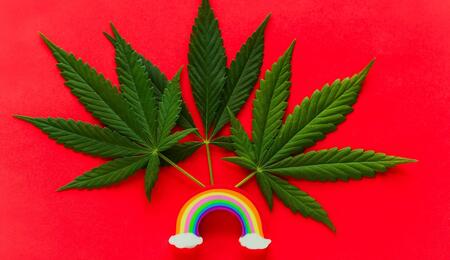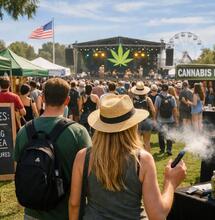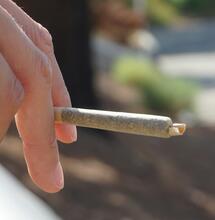Flying the Rainbow Flag: Cannabis Community Joins Pride Month Celebration

On the 25th anniversary of the voting of California's Proposition 215, which legalized cannabis for medical use, there's no greater way to honor LGBTQ activism for the cannabis cause than to extend a hand of friendship and show your affection wholeheartedly.
When the state of California moved to legalize medical cannabis a quarter of a century ago — it wrote history, and LGBTQ activists of the day immensely helped achieve this important national milestone. The Pride Month of June is the perfect occasion to remember how the two countermovements intertwine historically.
When it comes to cannabis legalization, it's often an issue of interest to the criminal justice system. Hundreds of thousands of Americans every year end up charged on a cannabis-related basis, with advocates nationwide loudly pushing for once-and-for-all decriminalization of the plant and reduction of arrest rates.
While today we're on the verge of making legalization happen, the movement takes its roots several decades back, and the LGBTQ community has always played an important part — supporting and leading the change on the cause of cannabis legalization. Historically speaking, the initial push for the legalization of medical cannabis in the U.S. began in response to the AIDS epidemic. Last Saturday, June 5, marked 40 years since the first case was diagnosed in the U.S. in 1981. But even before the onset of AIDS, gay people in the U.S. were already writing history regarding cannabis legislation.
In 1978, San Francisco Supervisor Harvey Milk — the first openly gay man to take on a role in a public office in his country — helped pass a proposition that encouraged local law enforcement to stop arresting and prosecuting people for cultivation, distribution, or owning cannabis. The proposition is now considered the first cannabis decriminalization bill passed in the nation.
Four decades later, it's already become a tradition for cannabis companies in California and other states across the U.S. to put a rainbow label on their products. With every purchase you make from many of these brands, you are likely helping fund a cause where part of the money is allocated to various LGBTQ causes — notably also LGBTQ folks who were imprisoned based on marijuana convictions. So, the struggle is shared.
While it may seem for some that cannabis companies are just following a general trend, where like other sectors, they are just trying to cash out during Pride Month, there's obviously more to the connection. It's a charge a lot of cannabis businesses say they take to heart in a bid to recognize the debt the entire industry owes to LGBTQ activists who have relentlessly pushed for change in the past. Nevertheless, LGBTQ advocates on cannabis legalization are here to stay, as are cannabis businesses run by members of the LGBTQ community, whose number is more significant than ever and growing.
How the LGBTQ Movement Associates with the Cannabis Movement?
The ties between the two counterculture movements — the cannabis and the LGBTQ movements — have decades of shared history and advocacy. Or, as Michael Koehn, 75, of San Francisco told The Orange County Register, "the genesis of the cannabis movement, gay people served at the heart of it."
Since he was diagnosed with HIV in 1985, Koehn has been fighting for civil rights for LGBTQ people and cannabis consumers, the Orange County Register reports.
Koehn's husband, David Goldman, 70, also of San Francisco, said, "If it hadn't been for activity among gay folks, we wouldn't have had medical cannabis on the ballot in 1996."
While Harvey Milk made a significant change in the late 1970s, as Koehn and Goldman suggest in their interview, what really prompted LGBTQ activists to push hard for cannabis legalization was the federal law change that followed during the 1980s.
At the time, the only facility authorized by the federal government to cultivate cannabis for research was the University of Mississippi. An investigative drug program was set up at the university where, at the peak of the AIDS epidemic, people were able to access cannabis flower to medicate the harsh symptoms of the disease they were suffering.
As Goldman explains, cannabis was "the only thing" that helped people with AIDS "combat their nausea and anxiety and pain." Koehn and Goldman were both diagnosed with AIDS in the 1980s, and they experienced the benefits of cannabis medication firsthand.
"I was able to go to work because cannabis helped me make it through the day," Koehn told The Orange County Register. He also enrolled in a trial study in San Francisco, where he took strong experimental medications three times a day.
In 1991, the Federal Drug Administration approved the use of Marinol, a prescription drug with synthetic THC, designed to treat appetite loss and weight loss in patients with AIDS. At this point, the federal government closed access to cannabis at the University of Mississippi, instructing people to require doctor prescriptions of Marinol.
However, Marinol lacked some of the chemicals naturally found in the cannabis plants, and which, in combination with THC, addressed other health issues such as inflammation, Goldman told the Orange County Register. Subsequently, AIDS activists took off the streets of San Francisco and launched a campaign for medical cannabis legalization in the state of California.
The fight was also joined by Dennis Peron, a friend of Harvey Milk, an activist known to have sold pot in The Castro to men with HIV. The same year when his partner Jonathan West died of AIDS in 1990, Peron was arrested on charges of cannabis possession. Already the following year, in 1991, Peron, out of jail, gathered support for Proposition P in San Francisco.
Proposition P passed with 79 percent of the vote and demanded the state government to allow the medical use of cannabis. After that, Peron started the San Francisco Cannabis Buyers Club, effectively the first medical marijuana dispensary in the country. And in 1996, he co-authored California Proposition 215, which legalized medical cannabis at the state level, making the Golden State the first U.S. state to have done so.
Peron's was a remarkable generation of activists. For instance, he was joined by Mary Jane Rathbun, a hospital volunteer who picked the monicker Brownie Mary as she passed out cannabis-infused brownies to AIDS patients. Rathbun was on Peron's team when the San Francisco Cannabis Buyers Club was launched.
Paul Scott, longtime marijuana and HIV activist and who has presided with the Los Angeles Black Gay Pride Association, has told the Washington Blade on an earlier occasion, "We had all these other diseases that marijuana helps for. But it wasn't until the visual effect of young white men dying in the hospitals with AIDS that it shook the conscience of America and began to change the law."
How the Movements Intersect Today?
The events of the 1990s were the foundation of California's legal cannabis industry, paving the way for a new generation of business owners and community leaders who are recognizing the historical link between the LGBTQ and cannabis countermovements. However, today, at a point in time when the United States has made such a significant shift on both LGBTQ and cannabis issues, there are members of the LGBTQ movement who oppose legal cannabis, as well as cannabis farmers who aren't so fond of LGBTQ people either.
Fortunately, they are outnumbered by those who are supportive of each other and of each other's causes. 28-year-old Lex Corwin owns the Venice-based Stone Road cannabis company, which sells curated joints, cannabis flowers, and concentrates throughout the country. His is one of the brands that are highly inclusive to both LGBTQ and cannabis communities. This month, customers who buy products from Stone Road will be supporting the LGBTQ Freedom Fund, which covers bail for incarcerated LGBTQ people. Stone Road's products are sold in California and in places like Oklahoma, where Corwin told Orange County Register that he knows the gay imagery might not be so welcome. In fact, a related post has cost his company's Instagram profile to lose 250 followers in a day.
As Corwin remarked on the matter, "If the work is good and the image makes you think, ultimately we did our job. And you don't have to love it." As Corwin further highlighted, the cannabis and the LGBTQ communities make good allies as members of each group know what it feels like to be excluded, therefore they are naturally inclined to be open and inclusive.
Cannabis culture has even adopted wordings from the LGBTQ movement, including "coming out of the green closet," to ascertain to family members that you're smoking pot or have found a job or internship within the cannabis industry.
Is It Difficult to Share Some Love and Pride?
Not at all. In fact, it's a fundamental value of the cannabis community. In its essence, since its inception, the cannabis community has been about peace, love, understanding, and obtaining new and different perspectives. So, there really is no place for hate in here. On the 25th anniversary of the voting of California's Proposition 215, which legalized cannabis for medical use, there's no greater way to honor LGBTQ activism for the cannabis cause than to extend a hand of friendship and show your affection wholeheartedly. It doesn't matter if you are straight or gay, black or white, male or female, or simply not fitting the binary spectrum — the party is at its best when everyone is high. The burning joint tastes the sweetest when nobody is omitted from the circle. Happy Pride month, folks!



